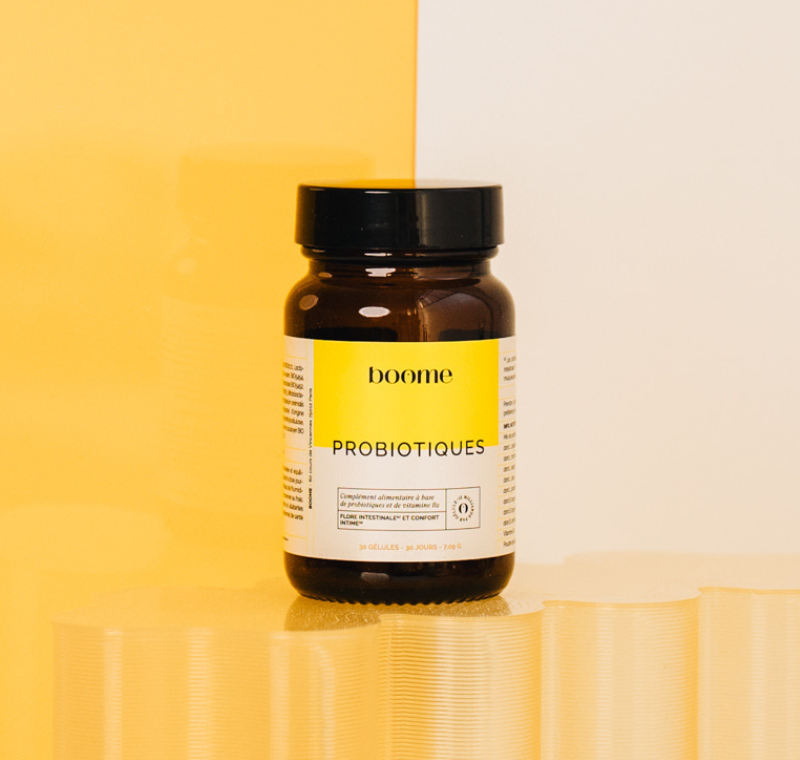
What if tiny, invisible allies could transform your pregnancy? Probiotics, these essential microorganisms, play a key role throughout our lives and take on particular importance during pregnancy, where they contribute to the well-being of the mother-to-be and her baby [1]. From preventing digestive disorders to reducing the risk of vaginal infections, their benefits are multiple… and often overlooked. Which probiotics should you choose? When should you incorporate them into your daily life? In this article, we explain how these “good bacteria” can provide real support for you, your own microbiota and your baby. Let’s go!
Quick reminder: what are probiotics?
Probiotics are living microorganisms, mainly bacteria and yeasts, that play a key role in the balance of our microbiota. The latter is a complex and dynamic ecosystem, composed of billions of microorganisms distributed in different parts of our body, including:
- the intestines,
- the vagina,
- the skin,
- the mouth.
In the intestinal microbiota , probiotics actively participate in several essential functions:
• Facilitate digestion by contributing to the breakdown of food [2];
• Support the absorption of nutrients such as iron, calcium and vitamins [3];
• Help strengthen the intestinal barrier limiting colonization by pathogens [4].
On the vaginal microbiota side , they are not idle either! They maintain an acidic pH and thus limit the development of unwanted microorganisms, helping to reduce the risk of infections.
In short, by supporting these microbial ecosystems, probiotics contribute to our overall well-being at every stage of life, and particularly during sensitive periods such as pregnancy.
Can you take probiotics during pregnancy?
Let's not prolong the suspense any longer: yes, you can consume probiotics during pregnancy. But (because there is a "but"!) on condition that you choose suitable and specific strains whose benefits have been scientifically studied and documented.
In general, these microorganisms would bring benefits not only for the future mother, but also for the development of her baby [6].
Strains such as Lactobacillus rhamnosus or Bifidobacterium longum , for example, are commonly studied for their positive effects on the human body , particularly during pregnancy. They could strengthen natural barriers against pathogens and help limit microbial imbalances linked to these hormonal changes.
However, we advise you to opt for products specially formulated for pregnant women . And, of course, to talk to your doctor or midwife before starting your treatment, if that can reassure you.
What are the interesting benefits of probiotics during pregnancy?
The benefits of probiotics for expectant mothers have been studied and proven many times. Here are the main effects of probiotics documented by scientific research.
Taking care of the intestinal and vaginal microbiota
At the digestive level, probiotics promote the balance of the intestinal microbiota , which is in high demand during pregnancy. They help maintain regular transit and reduce digestive problems such as constipation (common among new mothers). Strains such as Lactobacillus reuteri and Lactobacillus paracasei support smoother digestion by balancing the intestinal flora , thus helping to alleviate the inconveniences linked to hormonal fluctuations.
At the vaginal level, lactobacilli, particularly Lactobacillus crispatus and Lactobacillus rhamnosus, play a key role in maintaining an acidic pH within the vaginal microbiota , essential to help prevent common infections such as mycoses or vaginosis. By supporting the vaginal flora , this helps reduce the risk of pregnancy-related complications.
Did you know that omega-3 also provides important benefits for pregnant women, including supporting the development of the baby's brain? Our article on omega-3 and pregnancy tells you all about it!
Help reduce the risk of gestational diabetes
Some probiotic strains may play a role in modulating factors associated with gestational diabetes. For example, some studies suggest that Lactobacillus rhamnosus may contribute to:
- improve insulin sensitivity
- reduce general inflammation.
Two key elements in the regulation of sugar metabolism. Although these results are promising, the available data remain limited, and further research is needed to confirm these effects. However, their ability to support a balanced intestinal microbiota opens up interesting perspectives to support pregnant women in managing their metabolic health.
Supporting iron absorption during pregnancy
Pregnant women are often iron deficient, especially in the last trimester of pregnancy . A balanced gut microbiota plays a key role in nutrient absorption [8]. Some probiotic strains , such as Bifidobacterium longum, could therefore help to indirectly support iron assimilation. However, these effects remain indirect and depend on many factors, including diet and overall health.
Strengthening the baby's immune system
Yes, probiotics do not only influence our health... But also that of the baby, since they play a role in the development of its microbiota. This process begins mainly during birth, particularly during a vaginal delivery , where the baby comes into contact with the microorganisms of the vaginal canal and the maternal flora.
The intestinal microbiota , which hosts approximately 70% of the body's immune cells, is essential for the development of the immune system. A healthy maternal microbiota can therefore contribute to the establishment of a balanced intestinal flora in the newborn, thus supporting its nascent immunity. The consumption of probiotics during the last months of pregnancy is therefore of real interest.
When to take probiotics during pregnancy and how to choose them?
When choosing a probiotic supplement, it is essential to check the strains it contains and their specific benefits. For example, Lactobacillus rhamnosus has been studied for its role in supporting natural defenses and reducing microbial imbalances related to pregnancy. On the other hand, Lactobacillus reuteri may help maintain more comfortable digestion and alleviate digestive discomforts, such as constipation, often observed in expectant mothers . Not bad, huh?
But, again, do not hesitate to consult your midwife before starting a treatment. He or she will be able to assure you that the products chosen are suitable for your situation.
Probiotics are not limited to dietary supplements! You can also integrate them into your daily life through other forms, such as fermented foods (kefir, certain dairy products such as yogurts, sauerkraut).
And if you are still planning a baby… Even better! Because we now know the ultra-beneficial link between probiotics and fertility . So, adding probiotics from the preconception period can help you prepare your own microbiota for the upheavals it will undergo.
In short, you will have probably understood: probiotics for the intimate and intestinal flora are essential allies during pregnancy, since they support the well-being of young mothers and their babies. By balancing the intestinal and vaginal microbiota, they promote a serene pregnancy and a gentle development of the newborn.
Sources:
[1] Jarde A, Lewis-Mikhael AM, Moayyedi P, Stearns JC, Collins SM, Beyene J, McDonald SD. (2018). Probiotics in pregnancy and maternal outcomes: a systematic review and meta-analysis. British Journal of Nutrition, 119(1), 1–11
[2] Marteau P, et al. (2001). "Bacterial flora in the gut: effects of probiotics." Journal of Clinical Gastroenterology, 30(2), 131–134.
[3] Ouwehand AC, et al. (2002). "Probiotic and other functional microbes: from markets to mechanisms." Current Opinion in Biotechnology, 13(5), 483–487.
[4] Macfarlane GT, et al. (2006). “Probiotics, infection and immunity.” Current Opinion in Infectious Diseases, 19(5), 457–462.
[5] Ravel J, et al. (2011). “Vaginal microbiome of reproductive-aged women.” Proceedings of the National Academy of Sciences, 108(Suppl 1), 4680–4687.
[6] Isolauri E, et al. (2002). “Probiotics in human disease.” The American Journal of Clinical Nutrition, 73(6), 1142S–1146S.
[7] Luoto R, Laitinen K, Nermes M, Isolauri E. (2010). Impact of maternal probiotic supplemented dietary counseling on pregnancy outcome and prenatal and postnatal growth: a double-blind, placebo-controlled study. American Journal of Clinical Nutrition, 91(5), 177–183.
[8] Ouwehand AC, et al. (2005). "Probiotic and other functional microbes: from markets to mechanisms." Current Opinion in Biotechnology, 16(3), 204–211.









